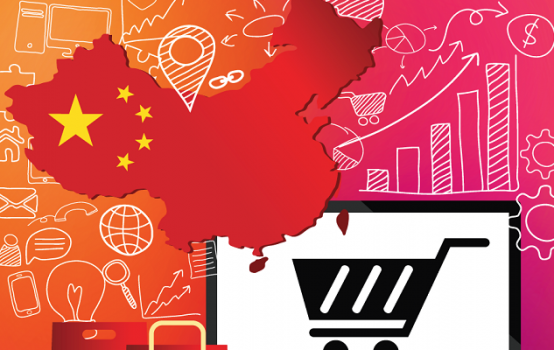Alibaba high-end membership APASS, what the luxury brand needs to know
September 9th was Alibaba’s APASS Day
Red carpet, hot girls and boys dressing up, while this is not a movie award ceremony, it is the first APASS off-line anniversary event held by Alibaba recently in Shanghai. They also invited Martha Lahti, SKII, Estee Lauder and many other international brands to join.
At this event, Alibaba Chief Marketing Officer Dong Benhong first revealed the level of APASS spending: “Based on the current membership size, these APASS members spend at least 30 billion RMB of their net purchases each year.”

Who is this group of people?
According to Ali group customer experience drive and Innovation Center General Manager Wang Hai, he said “APASS members are mainly trendy mothers, business elites, online shoppers and business generation”.
Here we have some examples. Zhang Yixin is a freshman in college. She spent 1 million last year on beauty products, jewelry and other luxury goods to simply just dress herself up.
Wang Ruoxi has 12 years of experience on Taobao. She would spend 800 thousand to buy luxurious watches and many other pricy goods including exorbitant Martha Lahti. Last year, she bought 16 brand-name handbags on Taobao. Right now, she makes her own skin care brand on Taobao’s line and transitions into a seller from a buyer.
In addition to our “super-chop type” buyers, Zhu Rongfei, one of the APASS members, is a “collection type” buyer. She bought more than 300 sets of Lego Limited Edition toys online as she is a maniac Lego fan.
What is APASS?
This lavish style of spending has made them gain the Alibaba Passport, also called APASS. It is an exclusive rewards program and a combination of Facebook, Amazon Prime and the American Express Black Card. Its 100,000 members get unusual perks in daily life such as abnormally good deals on trips, free return of products purchased online and considerate personal service. Meanwhile, they are also encouraged to join online communities of shopaholics who blog and talk up Alibaba.
 When Zhang Yixin mentioned the APASS membership service, she spoke with excitement: “What moved me most was that once, just right before an important show I had the next day, I lost my dresses that I was going to put on. The exclusive customer manager managed to find a seller in the city at night and got me the dress in time. It was amazing.”
When Zhang Yixin mentioned the APASS membership service, she spoke with excitement: “What moved me most was that once, just right before an important show I had the next day, I lost my dresses that I was going to put on. The exclusive customer manager managed to find a seller in the city at night and got me the dress in time. It was amazing.”
What luxury brands should know about APASS?
If luxury marketers doing business in China want to understand Chinese consumers better, they need to pay for professional market research agencies to do it. The APASS program offers a shortcut for brands to achieve this goal. It not only allows them to gain insight into their potential consumers, but it also shows them who they should target directly.
Even though it remains ambiguous whether APASS truly has what it claims to offer to luxury brands in China, brands such as Louis Vuitton, Ocean glasses, Antonio Banderas Guerlain, and Maserati are already among those who are beginning to test out what the APASS can reach.
If you need help to sell in China, contact us!
[recent_posts count=”3″ date=”true” thumbnail=”true” category=”1″]
5 Bugs To Avoid When Doing E-Commerce In China
Have you ever tried to build a new overseas brand and fail in your attempt? In any approach to China, foreign brands often make some common mistakes when trying to sell their products in China mainland. Although such misconceptions are not exclusive to online environment, we will focus on those that particularly affect your approach to e-commerce in China. China is already the world’s first e-commerce market.
Are you going to miss its enormous potential?
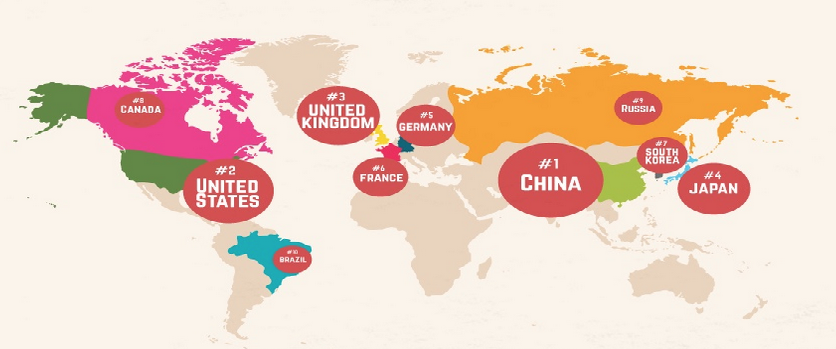
First bug: China is mobile, and you better record it
It is not the first time we tell you this, and for sure it won´t be the last. As we mention before in our article “How to Take Advantage of the Latest Ecommerce Revolution?”, Ecommerce has been a great revolution for both companies and customers.
Nowadays, Chinese prefer to use their mobile devices rather than their laptops and according to the new trend, companies have already starting to adapt themselves to portable devices. Moreover, those companies using U-commerce are focused on improving the customer experience through customizing and navigation created in cooperation with the User.
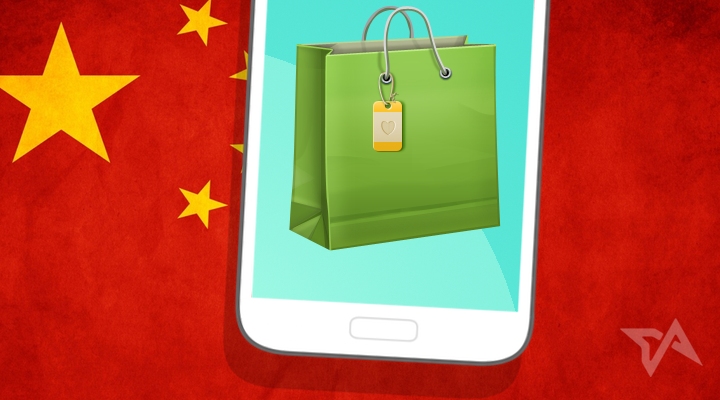
Second bug: E-commerce may be an asset in your country, but in China is irreplaceable
We cannot fail to mention Frank Lavin, CEO of Export Now, when he says,
“In China, Ecommerce is the cake.”
This may mean that you will need to adapt your business to the new environment. Do not expect it to be China who suits you, this does not work this way.
Remember that whoever hits first, hits twice. Embrace e-commerce as the enabler of your business it is, and take advantage of the immense benefits that electronic commerce can bring to your company to start selling around the World!
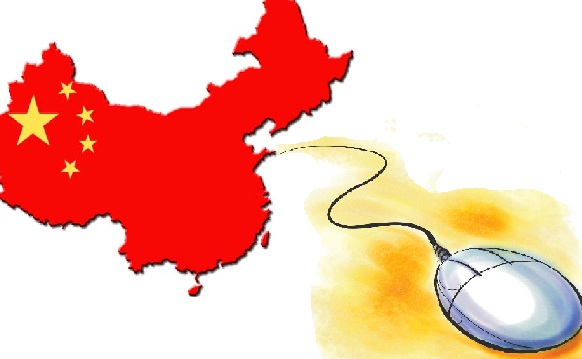
Third bug: Social Media is there to stay. Register your account and start moving!
Surely you’ve never heard the words Baidu, WeChat and Weibo… and let us tell you that you have a huge problem in China.
Not only around the 93% of the online searches in China are done in their own search engines –Have you ever heard Google does not work in China?– but also about a 68% of the customers take a look on the official Social Media account before buying.
Do not miss the opportunity to have a voice in that huge chicken coop is the network, start developing a tailored communication strategy for your brand and gain your piece of the cake!

Fourth bug: Domestic and lazy thinkers, or how the triumph from a day doesn’t make it daily
Do you think you will keep doing in China pretty much the same things you were doing before and as a result you will achieve success?
A basic rule you should never forget again is, no matter the experience and the many different markets in which you have entered before, is that new horizons always implies a new starting on your understanding of the target, so we definitely encourage you to start a market analysis.
Will your brand be competitive in China?
Do you offer something different regarding your competitors?
Is there a suitable market niche in the country ?
These and a thousand more questions require a prior discussion, keeping in mind that China should not be underestimated: the country enjoys some peculiarities you definitely must know before starting your landing.
We strongly recommend you seek assistance from professionals focused on the Chinese market, in order to enhance your chances of success in the country.

Fifth buf: Do not try to do everything by yourself, ask for advice
We are not tired of saying it, and will do so again: China is not a flat road. Do not try to embark on this mission unaccompanied, but pick very well with whom.
Look for complementary partners interested in joining forces, go to Government agencies dedicated to external actions and internationalization and definitely search for specialized agencies in the country to start outsourcing some tasks.

Already in search of a consulting expert in digital marketing and e-commerce? You have come to the right place.

New Online Advertising Rules in China
New online advertising regulation in China will impact all digital business with presence in China. Here we bring you an analysis overview to start adapting to the new trend in advertisement.
It would be after the death of a college student who took part in an experimental health treatment found in Baidu, when popular pressure would force the Government to begin an ads regulatory change.
The Internet Ad Interim Measures, a new regulation prompted by the State Administration for Industry and Commerce of China, went into effect in September 1st. Therefore, it arises from the Government’s claim by adopt new rules over online advertisement: email, paid searches, embedded links, images, and videos are already subject to the new law. Its aim is avoiding the spread of misleading advertisements on the Net, and correct the prevailing liberality so far.
The new online advertising regulations are expected to impact on Chinese Digital Marketing as a whole: social media, search engines, apps and electronic commerce in the country will have to move under the new guidelines.
A step closer to the uses and customs in Western advertisements
For the first time in China, the new measure features a specific definition of Internet advertising; often, foreigners suffer from a lack of legislative safety in China. Therefore, conceptualization is a step forward to define clearly not only the concept, but also its extension:
“Internet advertising is advertisements that directly or indirectly sell commercial goods or services through the websites, web pages, internet applications and other forms of Internet media including text, images, audio, video and etc.”
Moreover, the regulation comes to underline its main purpose:
“To protect the legitimate rights and interests of consumers, and promote the healthy development of the Internet advertising industry.”

In what fields are these changes applicable? What changes will take place after its implementation?
The regulation is particularly focused on a list of fields described below:
-Healthcare and medicine
-Food and beverage
The main measures to be starting to apply can be summarized as:
–First, the Law requires to place the word “advertisement” in a prominent position and clearly distinguishable at first sight.
–Second, every field subject of special regulation needs a previous review and an approval process by authorities.
–Third, online advertisements for prescription medicine is banned. A special measure in health products is also extended to medicines, pesticides or medical supplies.
–Fourth, tobacco online ads are also banned.
–Fifth, any paid search results, links or content must be clearly identified by the word “advertisement”.
–Sixth, users should not only have the choice to close an ad, but also this has to be easy to them.
–Seventh, paid links and contents must be clearly detailed at a glance.
–Eighth, any attached ad and/or promotional links to an email should have been allowed previously.
–Ninth, any misleading and/or false ad is considered illegal from now on.
Who is especially affected by the new regulation?
Under this measure, the biggest impact falls on the largest Internet companies in China. Baidu and Bing should apply new restrictions on ads; it should not be forgotten that, much of the incomes of Baidu, Weibo or Alibaba come advertising.

But also traditional Social Media must change. WeChat or Weibo offer paid content; as we mention before, pop-ups, ads or links should be first permitted, which will force companies to evolve the way advertising is offered to Chinese users. Seems marketers should start creating better ads, or contravening the prevailing legislation with all the penalties that that means.
There are plenty of creative ways to sell your services and products in China. In search of a Digital Marketing Agency?
Infographic: 10 Things You Need To Know To Build a Chinese Website
A picture is worth a thousand words
After the great success achieved by our two articles 10 Things You Need To Know To Build a Chinese Website (I) (II), in the team we have thought it would be a good idea to summarize and turn them into an infographic.
We hope you enjoy it as much as we enjoyed its elaboration 🙂
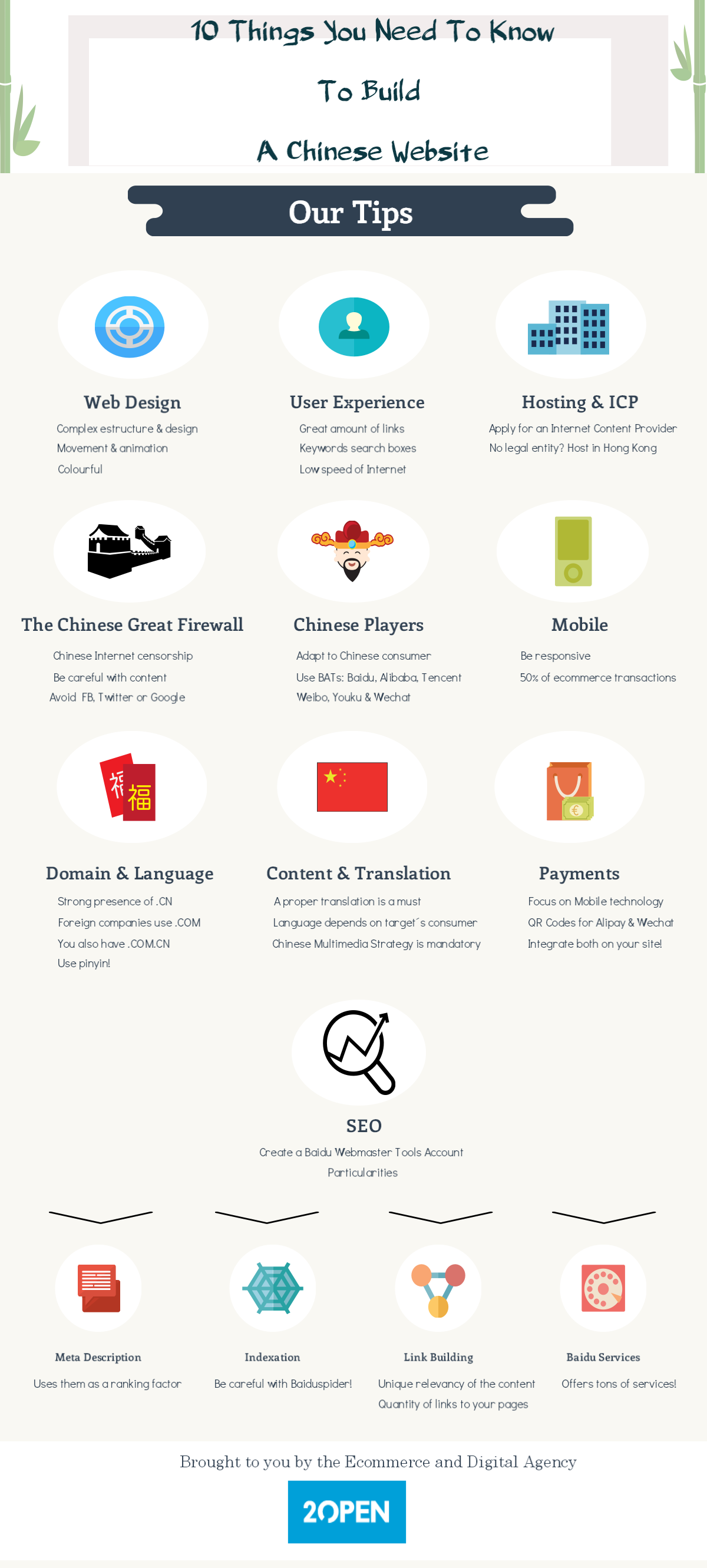
Are you looking for a digital marketing and ecommerce agency?
Visit us. Let´s have a talk!
Is Sina Weibo On The Way Out?
There are plenty of Social Media platforms in China: while a few achieve great success, many succumb to a highly competitive scenario.
Result of its dynamism, it is essential to keep attention on the changes that China faces in the digital world.
From 2 Open, we have prepared a brief introduction about Weibo´s current situation.
Our goal is to give you some tips to fully understand what is going on with one of the biggest Chinese Social Media.
Do not hesitate to contact us for a more thorough analysis!
Weibo is a Social Media platform to produce, share and find out Chinese-language content.
As a leading platform, provides an easy way to express in real time and interact with people and corporations.
Its importance is not only due to its capacity to be an official/unofficial news source, but also because it allows people to express themselves in a public way.
The doomsayers come into the picture
Currently, Alibaba is the biggest Chinese e-commerce company: it provides C2C, B2C and B2B sales services via web portals, plus electronic payment services, a shopping search engine and data-centric cloud computing services.
Three years ago, Alibaba bought 18% stock of Weibo. Since then, several media have speculated that Weibo or even Sina might be acquired by Alibaba in a short time.
Encouraged by the rise of Wechat, many marketers have predicted the fall of Weibo. Well, the latest Earnings report proves they were wrong.

Is Weibo on the way out? Let the Earnings speak the truth
According to official Earnings Report of 2016 Q2 from Sina Weibo, the Net profit of 25.9 million dollars (net revenues of $ 146.9 million) increased 516% compared to the same period last year.
Moreover, Weibo 2016 Q2 data shows the Total revenue of Weibo is 146.9 million, including 127.2 million revenue from Advertising business, value-added services $ 19.7 million for value-added services.

Let’s review the users’ data on Weibo now
Monthly Active Users –MAU- is 282 million, increase 33% compared to the same period of last year. In addition, Daily Active Users –DAU- is 126 million with 36% increase compared to same period of last year.
Is noteworthy that 89% of them are mobile users.
The progress is closely related to their own media advantage
Three years ago, relying on its social communication advantages, Weibo attracted $ 600 million of Alibaba, while became an effective channel for celebrity campaigns, events, marketing and other commercial activities.
After that, Weibo focused on the advertising model. At the end, it decided to put aside Alibaba and manage the business alone.
In 2016 Q1, advertising investment from small and medium enterprises increased 147%. The quantity of SME’s and self-service advertisers reached 830K with 25% increase compared to previous quarter.
In 2016 Q1, investment in small and medium advertising revenue grew 147%, the number of SMEs and self-service advertisers reached 830,000 and a 25% increase the previous quarter.
Why both SMEs and big brands value Weibo a lot?
Both leverage it as an important channel frequently, specially because:
- Increase of traffic and users with 282 million MAU
- Optimized Algorithm of Ad Platform
- Active Internet Celebrities
- Live-streaming
The outbreak of short videos
We should add that speaking of its development path, the outbreak of short videos is also a milestone of growth of Weibo.
According to the 2016 Q2 Earning report, the playback amount of short videos on Weibo has increased 200%.
Meanwhile, the Internet celebrity economy is rapidly booming. Based on short videos, live-streaming broadcast and e-commerce, Weibo occupies the core position of social media with its incredible social power.
Margin improvement for future
The operating leverage will keep being prominent in the future. Based on the non-GAAP, the operating Margin rate of Weibo was 23.6% in the second quarter.
It is expected that the Weibo´s operating Margin rate could reach 25.2% in the third quarter, 23.4% in 2016 financial year, and 28.7% in 2017 financial year.
After seven years, Weibo proves to the world its strength and influence.
Do you still think Weibo is on the way out?
Our Digital Marketing and Ecommerce Agency have the experience of a team dedicated to know in depth the Chinese Social Media.
If you are looking to push your sales in China, do not hesitate to contact us.
Moreover, if you are interested in receiving to your mail the latest trends of Chinese Social Media, please suscribe to our monthly Newsletter!
This article has been edited by Paula Vicuña, from 2 Open.
Why China E-commerce Goes So Fast?
All of us are very well aware of the magnitude of the Chinese online market and, although it is currently the largest Ecommerce market in the world, it is also the most changeable one.
From 2 Open, we want to enable your approach to China giving you some practical guidelines about the current state of Ecommerce in China.
Understanding what is happening in China needs time and a constant willingness to learn: sometimes its fast evolution makes it hard to follow the new trends, other times foreigners just find an incomplete analysis.
According to the analysis report done by Data Center of China Internet -from now on DCCI-, China has currently taken the first place as the greatest E-commerce country in the world, while the online shopping penetration rate of China is in the second place after United States.
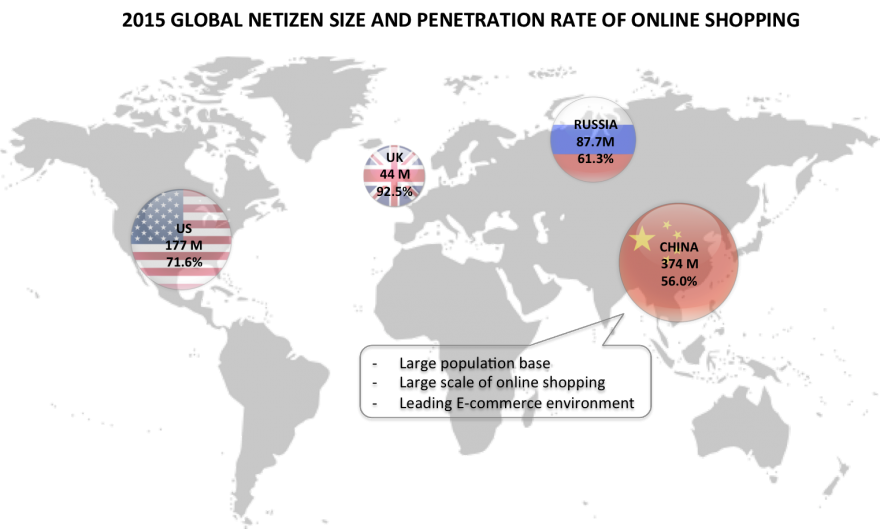
The result of China E-commerce indicates the Chinese economic keystone in recent years, also their development trend of commerce in the future.
As a result, in 2 Open we strongly believe there are more opportunities in the future for E-commerce development.
There are a range of factors we should take into consideration in our approach to the country:
E-commerce market is booming, due to the existence of multiple factors which stimulate the development
In 2015 in China, penetration rate of online shopping reached to 56%. This means there is a huge space to further development comparing with the most-developed countries, and a great opportunity to companies coming to China.
Although there are many factors which are promoting the trend, the main reasons can be summarized in a set of main points:
- Population: Until June 2015, China has 668 million netizens, 594 million mobile phone users and 374 million online shoppers. This leads us to a great size of online shoppers and a strong demand in domestic market.
- Policy: China and its Government have adapted many strategies and measures to promote the E-commerce development. It is a fact that the confluence of two forces have achieved incredible results in recent times.
- Technology: The mature E-commerce relating technologies facilitates the promotion of various industries, especially those related to the Big Data, Internet security, Online payment and Mobile technology. A niche market that is worthy.
- Enterprise: Internet companies have finally joined and distribute to the whole industry, so the result has been that most of the traditional E-commerce companies are transforming to the New Model. Thanks to it, the industry chains of BAT (Baidu, Alibaba, Tencent) cover a large area in China and it is expected to keep growing in future.
- Ecological Integration: The whole industry is getting into a mixture between online and offline industry. Take a look to Alibabas example: they have relied on the industry chain of E-commerce to integrate video, games, travel, finance and other fields into a complete unity. That is the future!
- Basic Infrastructure: Internet infrastructure develops rapidly, especially the Mobile Internet. But also 4G is changing the scene: in the end of July 2015, China 4G accumulated more than 250 million users and 4G base stations were over 1.53 million, of which the construction of TD-LTE base stations were over 1 million. Nowadays, 4G smart phone has already accounted for 82.7% of the domestic smartphone market and seems there is still a gap to fill.
Accommodating to the human-oriented strategy, the E-commerce marketing gets a standout result
With the diversification of E-commerce, the elements influence on the marketing result also became complicated, thus the marketing KPIs should be clear for the marketing themes and goals.
E-commerce marketing has changed from past into a new model of advertising, which is accommodated to the Internet users.
The Model of procedural purchase facilitates the result of advertising, optimizing the convention, and achieves 3 times of ROI:
- The user is the focus: Advertisement position of E-commerce marketing is transforming into human-oriented.
- Procedural purchase is pushing E-commerce marketing into OTG (On-The-Go) model.

Rapid growth of mobile terminal and Big Data brings more commercial values
Now in China Ecommerce market, users, marketing and advertisement investors are in favor of mobile terminal. With the development of mobile technology, the traditional business was greatly impacted.
¿The result? Big Data sharing connects user, product and service together; each data channel communicate with others can release a higher-value data stream.
Vigorously develop of the “festival event”
In recent years, the festival promotion has become an important way of arresting customers. Since November 2011, it has already turned into a battle for the Chinese leading E-commerce companies.
But also the advantage of big data sharing and innovated technology did a tremendous support in the precise marketing and advertisement.
Take Tmall as an example: in 2015, the turnover of Tmall reached ¥57.1 billion just in one day. A huge amount that can still increase.
The tremendous transformation that China lives, cannot be understood without experiencing it by firsthand.
From 2 Open, we have a global perspective and the expertise any company thinking on coming to China needs to develop its business in the country.
If you are looking to take advantage of Chinese Ecommerce, we will be happy to help you.
This article has been edited by Paula Vicuña, from 2 Open
How to take advantage of the latest E Commerce revolution? U-Commerce trend
Nowadays, we all are very well aware of the importance of Ecommerce on current business.
E-Commerce has been a great revolution for companies and customers, helping the exchange of goods and services without geographical barriers via Internet.
With most of famous brands selling via e-Commerce and the development of B2B, B2C and C2C markets, the last revolution has come to stay: the Mobile Commerce or better known, M-Commerce.
But, What do we mean when we talk about M-Commerce?
The increase of the usage of smartphones and tablets and the growth of its capabilities, lead to a higher percentage of the population using technological devices to purchase their goods or services. According to the increase of the demand and in order to take advantage of this new trend, Companies have already identified the need to adapt their ways of selling to the portable devices.
China, the biggest consumer via E-Commerce country and a technologically advanced market, is a good example to put into consideration: the Retail and C2C ecommerce sales have grown from the 9% to the 55.5% since 2013.
This information show us that nowadays, most of the C2C Chinese customers prefer to use the mobile device than their PCs or laptops.

Omnichannel Marketing, What´s its purpose?
At the same time, to E-Commerce has joined a new feature: the existence of the multichannel approach to sales, or “Omnichannel”.
This channel is looking for the continuous shopping experience of each customer. The aim of the Omnichannel Marketing is offering a continuous experience to the user, independent from the device or channel chosen.
In practice, this leads to a complete integration between phones, tablets and computers and it requires the combination of an anthropological and technological strategy in approaching the users in a smarter way.
From the combination of all this, arises the U-Commerce concept.
What is U-Commerce or Ubiquitous Commerce?
If we simplify, we would say that we are talking about U-Commerce when E-Commerce is based in the customer experience.
The user must be in the center of all Companies’ strategies. Those Companies using U-Commerce must be able to provide personalized service to their clients from the information they get from mobile devices and PC-s.
The keys are: customizing and navigation experience created in cooperation with the User.

How is this possible?
It is obvious that the technological development is responsible for this change and makes necessary to pay attention to the internal customer databases.
Companies must try to find out common interests between potential clients who visit their EShops, considering each potential customer as unique and with their own preferences and priorities.
Efforts should be directed to avoid high rates of leads who finally give up navigating in the last purchasing phase, and reach around 60-70%.
This is the crucial reason for companies to invest their efforts and resources in understanding the customers and their behavior: to boost sales.
A lack of privacy: How companies use data?
U-Commerce uses personal information in order to provide a personalized service. A big number of customers feel disrespectful that a company can get their personal information and manage it as they want. Therefore, we must emphasize the benefits that the data can bring to the user and treat delicately the data we are able to collect.
Times are changing and the number of E-Commerce consumers is increasing exponentially and also the M-Commerce is growing very fast.
It’s important to face it and consider user’s needs, their preferences and desires. So companies must rechange strategies and adapt to the new eCommerce “revolution”.
Are you thinking about improving the user experience and exploit the advantages that the use of Online Marketing gives us?
Come to us, We are expecting you!
This article has been edited by Paula Vicuña, from 2 OPEN.
Do other e-commerce platforms stand a chance against Tmall?
All of us are very well aware of the magnitude of the Chinese online market and, although it is currently the largest e-commerce market in the world, most of the market share is owned by the Chinese e-commerce giant Alibaba. Nevertheless, there are some other companies that also want their piece of the pie and with their vertical e-commerce platforms they are starting to put up a fight. This article will focus mainly on those vertical platforms that constitute an important part of the diverse Chinese e-commerce environment.
In the 4th quarter of 2015 China’s online transactions surpassed 644.38 billion RMB, the pie chart shown bellow contains the market share of the top ten Chinese e-commerce platforms:
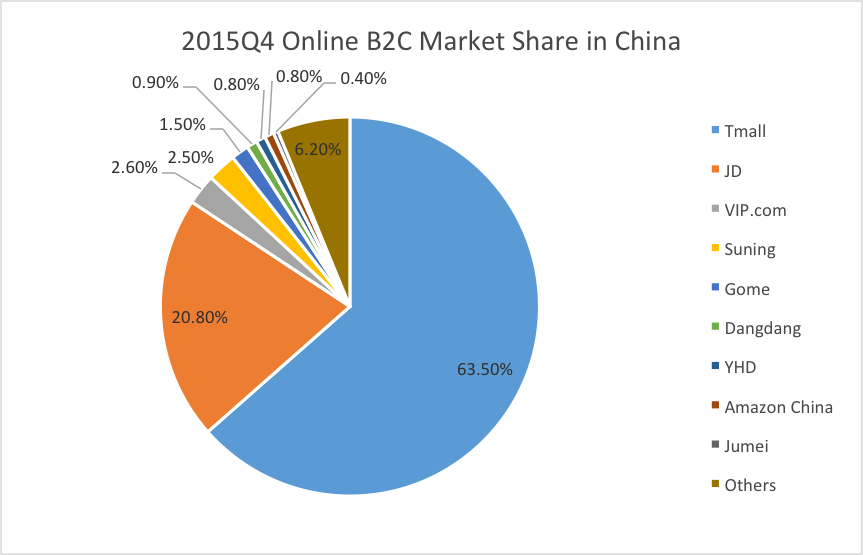
Before we continue, we first have to clarify the concept of vertical e-commerce. In this context, vertical refers vendors that offer goods and/or services that are specific to an industry or customers with specific needs. A vertical e-commerce platforms could be a independent brand or a specified category within a wide range of products such as clothes, 3C (computer, communication, and consumer electronics) products, cosmetics, etc.
If you already have a basic understanding of the Chinese e-commerce market, then you are probably familiar with JD.com. Currently the second e-commerce platforms in China after Tmall (owned by Alibaba Group), JD.com started as a 3C products vertical B2C website. Now, let us take a look at the market share of 3C products in China B2C online market:
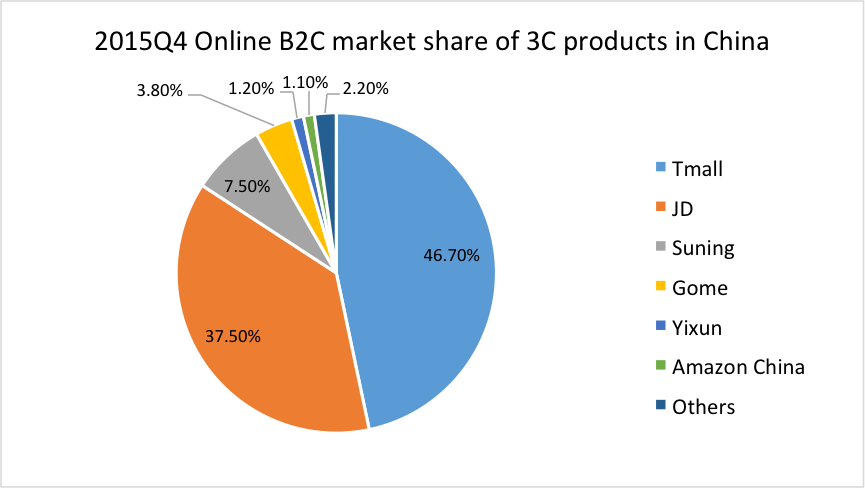
Although Tmall is still on the first spot, the difference in market share of JD.com is considerably higher than with regular products. Tmall and JD.com combined own more than 80% of the Chinese 3C products market. Suning, on the 3rd spot, and Gome, on the 4th, both also started specializing in 3C products, however, nowadays they have also diversified their range of products. At the end, it seems that there are no actual vertical platforms anymore.
To study the online market, we cannot miss the biggest category, clothes. In the 4th quarter of 2015, the total transaction of clothes is 235.57 billion Yuan, market share is shown below:
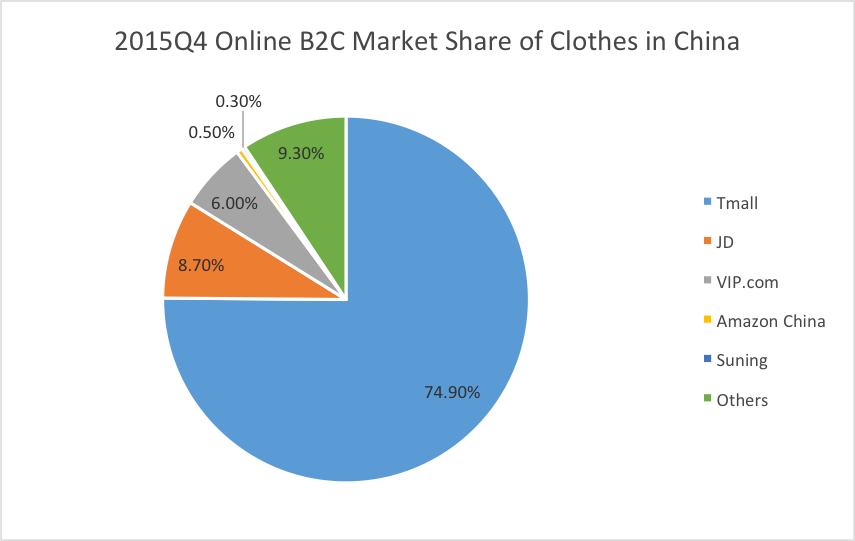
In this case, Tmall is leading with an absolute advantage of almost 3/4 of the market share. In this category, JD has 8.7% of the market share, VIP.com has 6%, and surprisingly others do not even have 1% individually, so from the big picture the vertical market for clothes is not active enough.
Another category that has had such a rapid growth we cannot ignore is the maternal and children products. Shown below is a pie chart containing China’s maternal and children products market share figures of major competitors in the last quarter of 2015:
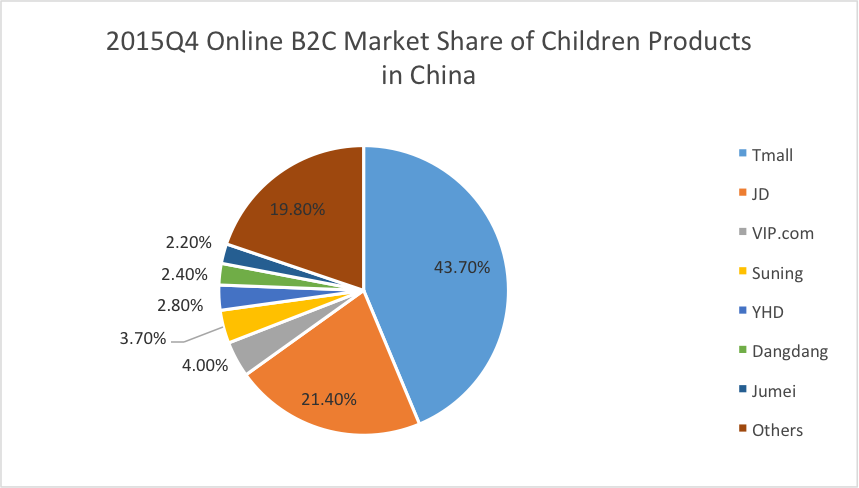
The most noticeable difference in comparison with other categories is the porcentage own by other platforms that adds up to almost 20 %. Although Mia, Beibei, Babytree and others are in that 20% it is still a big figure. In this category Tmall and JD.com own less than 70 % of the Chinese clothing market, so we can say, to some extend, that there is still space for vertical players.
The next category is books and, even though the books total transaction was just 5.31 billion Yuan, the market share gives us a slice hope of competing with general platforms, in this case Dangdang is leading with 43.8%, and Tmall is only on the 3rd spot, just after JD.com.
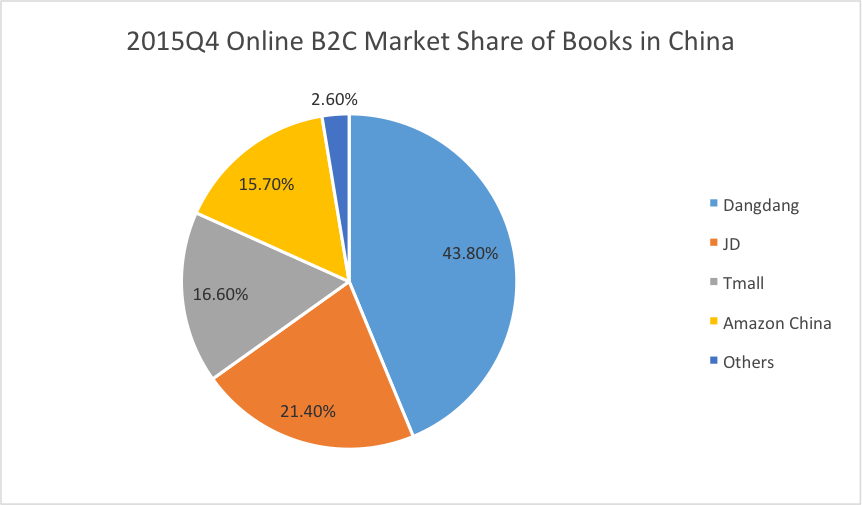
Finally, we cannot say all vertical online platforms are dead in China just because most of the categories are gloomy, there are still some worth a try, and you just need to know enough about the current situation. If you don’t, luckily you saw this article, and you know 2open can always help you to find the right channels. So don’t hesitate, contact us now!
All in all, even though Tmall dominates in the Chinese market, there is still space for other platforms to flourish. Vertical e-commerce platforms seem to be the wisest option, specify in a certain category, gather information about the current situation in the Chinese market, and carry out your business plan. If you need further information about the market, would like to help you find the right channels, or want us to set up your business in China, do not hesitate in contacting us. Our group of specialists will happily assist you.
This article was edited by Andres Arroyo Olson from 2 Open.
References.
All products data from
http://www.analysys.cn/yjgd/17684.shtml
3C data from
http://www.analysys.cn/yjgd/17676.shtml
Clothes data from
http://www.analysys.cn/yjgd/17678.shtml
Children products data from:
http://www.analysys.cn/yjgd/17680.shtml
Books data from:
2 Open keeps growing in Europe with our new office
The 2 Open family keeps growing in order to continue adding value to our customers within the global business world in which we live. China and Europe are now connected with four powerful offices (Shanghai, Weihai, Madrid and Cáceres) that clearly represent what we are and where we want to go; it represents the future and our origins making sure they align with our goals and our customers’ needs.
A business is like a living organism; it has a beginning, an end, and in between goes through a lot of stages that make the difference between success and failure. 2 Open is undergoing one of these stages in which we have decided to grow our organization in Europe to help your business development in China. What we are trying here, is to do the best we can at each and every stage and always think about what we have done, about the errors and successes, about the good and bad decisions, about the loyal partners and the ones that were not loyal, about the people who have accompanied us, learning from all these factors in order to, not only improve and grow as a business, but also as individuals.

I write these lines from our new office. Located in the heart of the Spanish capital, Madrid. It is a three floor co-working space that was an old factory back in the 20’s. Each floor has a 420 square meters open-plan area with huge windows, 5 meters high ceilings and decorated in modern style. We have a meeting room, photography/video studio, reception, relaxing area, and a huge space to do events; we want to organize an event related to China digital industry very soon and you will be more than welcome to assist.

Co-working is a global movement based on a simple concept: professionals from different sectors, freelancers, entrepreneurs and businessmen, share the same physical space to work on their own projects. But co-working is not only about sharing costs and breaking the isolation, it is also about belonging to a community of individuals who are open to exchange ideas, projects, knowledge, and most importantly, they are willing to collaborate. Co-working spaces are sprouting all over the planet; it is a global movement that is changing the way we work and the way we interact in workspaces. Co-working spaces are a reflection of the emergence of new models and new expectations in the business world and society in general, and 2 Open, is definitely going to leverage the advantages of these positive features. We will collaborate to get fresh and innovative ideas, resulting from interactions with other co-workers.

Come and visit us in our brand new office. We will be glad to chat with you about our passion: DIGITAL MARKETING IN CHINA and HOW TO DEVELOP YOUR MARKETING AND SALES in the Chinese online market.
This article was edited by Andres Arroyo Olson from 2 Open.



